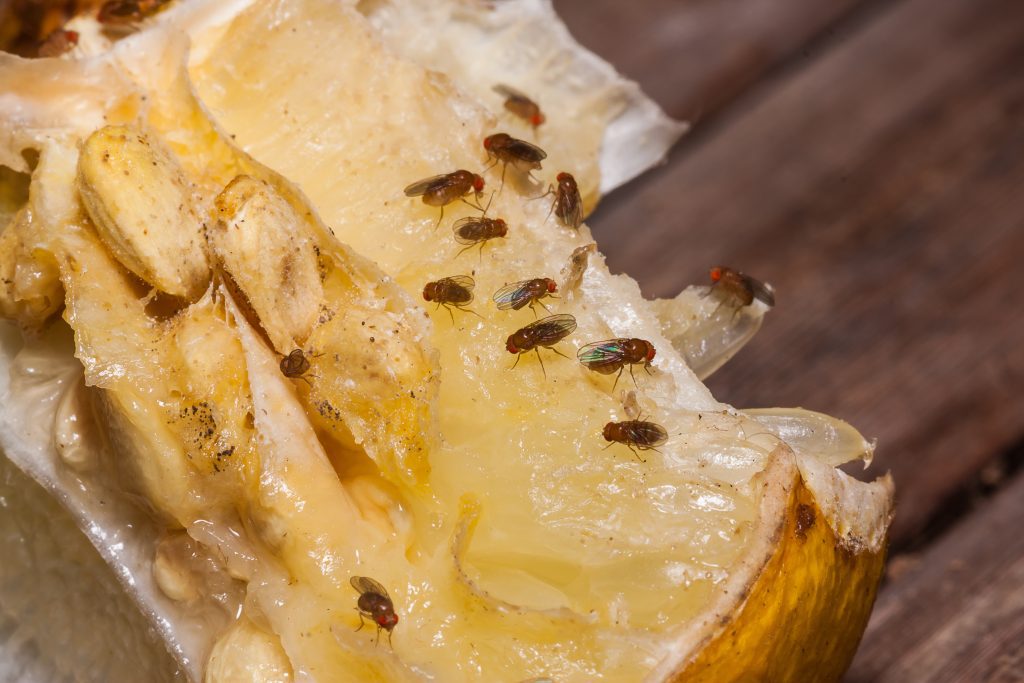Gnats vs Fruit Flies: How to Tell the Difference and Get Rid of Them Both
Gnats and fruit flies are annoying because they zip past you, through your front door into your house, and multiply before you can stop them. You might think, “They’re all a nuisance, so what difference does it make?”
Although they both appear similar in their small size, it is crucial to know the difference between gnats and fruit flies to banish them.
We can spot the difference at Vulcan Termite & Pest Control Inc., so you don’t have to guess—we’ve already figured it out. Keep reading to learn more about gnats vs. fruit flies and how to eliminate them.
Gnats vs Fruit Flies
Gnats and fruit flies cause so many of the same issues for homeowners and are easily mistaken for one another. But there are a few key differences to differentiate the two:
Color
Gnats range between grey and black, while fruit flies are tan or black.
Shape
Gnats have a long, thin appearance that resembles a small mosquito, while fruit flies have a round silhouette that resembles a common house fly.
Size
Gnats are about 1.5-3 mm, while fruit flies are a bit larger, around 3-4 mm.
Eyes
You can’t see a gnat’s eyes, but you can identify a fruit fly by its big red eyes.
Host Preference
Gnats are drawn to plants and soil, while fruit flies gravitate to decaying fruit, sugar, and other foods.
Feeding Habits
Gnats
You can usually find gnats (a.k.a. fungus gnats) outdoors, wherever the fungus they carry can grow, so they can lay their eggs and feed on the fungus with their hatchlings. Common examples of these fungus-friendly gnat hotspots include:
- In and around potted plants, garden beds, or other soil sources
- Dead animal carcasses
- Animal droppings
- Trash or compost bins
- Animal nests/other dwelling sites
- Sources of standing water
As you probably have the misfortune of knowing (since you’re reading this blog), gnats can also travel indoors and be a nuisance, especially to plant owners—they’re unlikely to harm your health, but they harm your plants. When gnats lay their eggs on your indoor or outdoor plant’s soil, the fungus spreads to the plant’s roots, leading to a gradual decline and eventual death.
Fruit Flies
Fruit flies feed on decaying matter, such as fruits or vegetables. They are commonly found in homes, restaurants, or other areas where food is processed or prepared.
Unlike mosquitoes, fruit flies aren’t vectors of viruses, so they can’t transmit diseases. However, fruit flies can and often do carry bacteria—including the typical culprits of food poisoning: Salmonella, E. coli, and Listeria—and spread them to things around your home that they land on. Touching these bacteria-contaminated surfaces can make you extremely sick and potentially require hospitalization.
Here’s What You Can Do
Here are a few prevention tips and tricks for handling gnats vs fruit flies. Knowing which one you’re dealing with is the first step to eliminating them.
Gnat Prevention:
- Avoid overwatering your plants
- Keep the soil dry and drain it as needed
- Take out your trash regularly
- Seal cracks around windows
- Add mosquito dunks to your watering can and other sources of stagnant water
Fruit Fly Prevention:
- Toss out over-ripe fruit or vegetables
- Keep your kitchen surfaces clean
- Inspect your produce before bringing it home (you can bring fruit flies home from the store)
- Store produce in the refrigerator
- Make a DIY trap made of apple cider vinegar and dish soap (this doesn’t work very well on gnats, btw—just these little fruit fly guys!)
Banish Gnats and Flies from Your Home
These buzzing little troublemakers may be annoying, but luckily, they’re mostly irritating and they’re not unstoppable. At Vulcan Termite & Pest Control, we know the difference between gnats vs fruit flies, and now you do too! Our household and yard pest services cover all indoor and outdoor insect problems, from targeted treatments to preventative management.
Tired of non-beneficial, pesky bugs buzzing around? Call us at (205) 663-4200 or click the button below to contact us online today for all your pest control needs!
Reserve Mosquito Treatment Today


